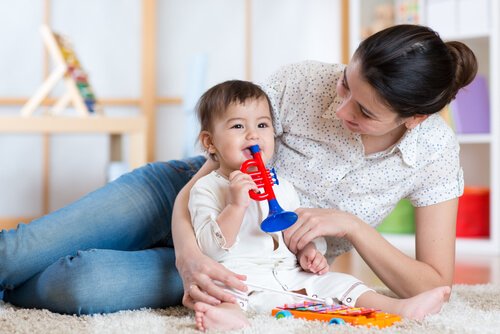Constructive Discipline for Babies

Constructive discipline with babies promotes socialization and ensures better integration in the future. The focus is on teaching, as opposed to punishing.
Discipline and obedience are crucial in raising the adults of tomorrow. Essential principles like respect and integrity should be taught to children from an early age.
What is constructive discipline?
Constructive discipline is about teaching, guiding, and encouraging participation in the learning process, as opposed to calling out ignorance or mistakes. Through discipline, children learn values, limits and rules for being part of a family and society.
Discipline teaches lessons and seeks to affect the infant’s happiness in the long term; punishment aims to modify behavior through fear.
Through discipline, the consequences of actions will be seen in a new way. Saying “I’m punishing you for lying to me” isn’t the same as reflecting on lying as a reproachable act. Disciplined children learn to take responsibility for their actions.
Using values as the basis of teaching is part of constructive discipline for infants. Honesty, respect, integrity, kindness: these are guidelines in the parent-child relationship and should be used instead of threats. Education based on these value will bring rewards in the future.
How is it applied?
At a young age
Constructive discipline for babies begins from a young age and is related to knowledge of limits (both personal and external), taking advantage of opportunities, and understanding risks.
Part of parents’ responsibility towards their children is to teach them about situations that represent danger. This education should always be positive, so the child can learn, accept, and internalize the lessons successfully.
Saying “no” to children, with love and affection, teaches them that there is a suitable time and a place for everything. Sleeping and meal times, positive routines and risky situations are all information that should be reinforced periodically.
Recognizing and attending to babies’ needs, without giving in to the pressure of crying, is part of constructive discipline.

Music therapy for integration
From the age of 8 months, babies begin a new stage of socialization. In this period, music therapy is a very helpful tool.
Sound and movement don’t just facilitate communication, they also promote social integration. That’s why music is an excellent ally for early stimulation, and also to enhance learning.
Active and curious
After the first year, babies become much more active, demanding, impulsive, daring and curious. At 18 months they can engage in simple reasoning. This is a good time to explain why there are rules.
At this age, children also begin to feel independent and develop personality. The word “no” is part of their vocabulary and parents must be firm. They should also reason with their children, emphasizing the consequences of their actions, in language appropriate for their age.
Between two and three years of age the word “no” is reinforced. Children want to do everything themselves.
Letting them do things is positive, while always paying attention to potential dangers. Close vigilance is necessary, without children perceiving it as a threat.
What they want
Constructive discipline requires patience and calmness on the part of parents, as children will try to impose their will.
There are various strategies that can be used in these cases. Distracting little ones can prevent them from doing things that aren’t permitted, and offering alternatives will help them understand that they can’t have everything.
In this way they’ll learn that some things are “yes” and some are “no.”

Constructive discipline encourages positive values and is long-lasting.
What’s strictly necessary
Keeping the word “no” for when it’s strictly necessary will prevent children from feeling overly restricted. When it needs to be used, it should be accompanied by actions.
The most important thing is to be consistent. If they can’t draw on the walls today, they can’t tomorrow either.
Instructions have to be repeated over and over in order to define limits and ensure they’re respected. Doing this with love as opposed to punishment will make a difference.
Realistic goals and appropriate words
Constructive discipline for babies requires the establishing of realistic goals. They should be defined according to children’s age, abilities and circumstances so that they’re attainable.
When children try to do something but can’t manage it at first, they deserve congratulations for the effort. This will motivate them to try it again, and to take risks.
Using the correct words can greatly influence children’s behavior. Words like help, magic, and guess get results. Specific instructions like “you can sit here” are more effective than generic ones like “stay still.”
From the age of three, children begin to follow these rules, if they’ve been instilled with discipline, love and patience.
From age 4, limits should be reaffirmed constantly and lovingly. Between the ages of 6 and 12 teaching should focus on relations with the environment.
This text is provided for informational purposes only and does not replace consultation with a professional. If in doubt, consult your specialist.
